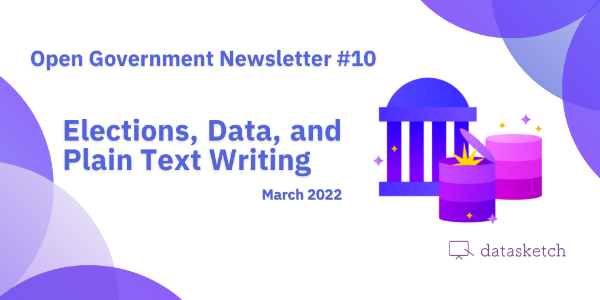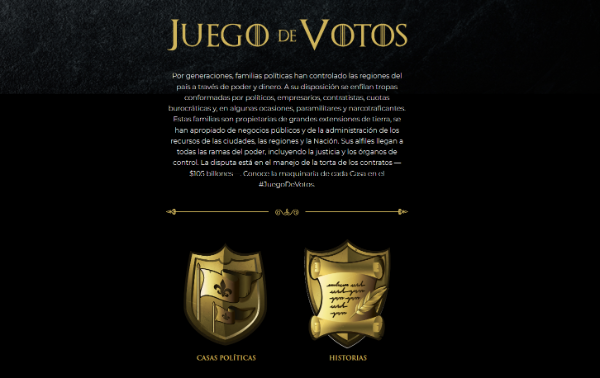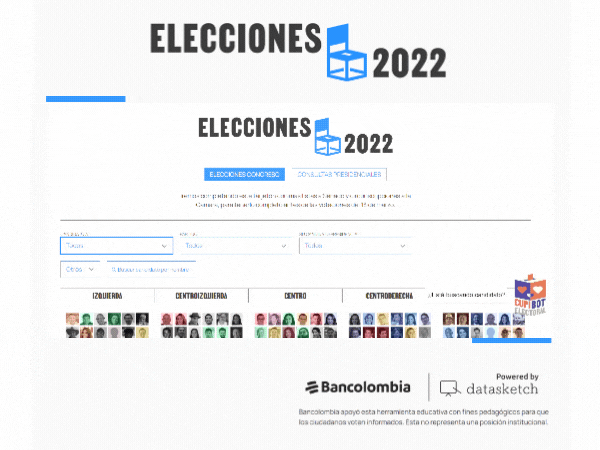Elections, Data, and Plain Text Writing - Open Gov #10
We review tools for electoral data visualization and events related to public innovation. March 2022.
Available in:

In this issue, we will continue compiling news on open government and add content on innovation. We will talk about the importance of using data visualization tools in election periods, and we will introduce how to bring information closer to everyone.
If someone forwarded you this newsletter and you like it, you can subscribe here. You can also check our blog and newsletter.
Electoral Data Visualization
On Sunday, March 13, the Colombian legislative elections will occur. Datasketch headquarters is in this country, so this issue interests us directly.
To promote more transparent elections, we support the web implementation and data visualizations of Juego de Votos (Game of Votes), a Cuestión Pública research. The tool allows us to learn about power networks, alliances, businesses, private interests, and family businesses of public servants elected by popular vote in Colombia.

Source: Juego de Votos | Cuestión Pública.
La Silla Vacía also used our tools to showcase its Elecciones 2022 platform that allows you to learn about all the candidates for Congress and the Presidency and their political affiliations.
These are the kind of visualizations we enjoy working on: they are based on research, bring data closer to the people, and are helpful to citizens in their informed decision-making. So, if you want to show data in non-traditional ways, don’t hesitate to contact us!

Source: Elecciones 2022 | La Silla Vacía
Innovation
The Aragon Open (Government) Lab
Open government and public innovation go hand in hand. Many countries have advanced with public policies in these areas. Both seek to foster participation and collaboration through new forms of articulation between actors that understand the context of profound societal changes.
The LAAAB is one of the public spaces that has best understood this connection in Hispanic America. An example of this is its program of activities for the first half of 2022.
It is a schedule full of conferences, cycles, and workshops. Although most of them are face-to-face, it is interesting to be aware of the results. They include activities with public servants and have a significant commitment to inclusion with proposals aimed at young people and adolescents, people with functional diversities, or families who do not usually participate in this type of space. Two of the activities that most catch our attention are
- 🎙 The Eduardo Madina and Manuela Carmena conference, within the Open Governments cycle, which will talk about democratic fragility and the new collective commitment because of its great speakers and a subject that interests us.
- 🏦 The workshops The city we want, civic design is taught to children and adolescents.
They also offer excellent resources, such as their methodologies to accelerate the systemic change of organizations.
Open Government Partnership
Australia and El Salvador might Leave OGP
Open government often relies on the political will of those in power and the political circumstances of countries.
OGP has formally warned Australia that it has acted contrary to partnership principles. As reported by The Guardian, OGP may review the country’s OGP membership for its failure to meet previous commitments and deadlines by failing to deliver its third action plan. In this case, the government has expressed its interest in continuing and has argued difficulties due to the pandemic.
El Salvador is in a similar, though not the same, situation. This country has also failed to meet its past commitments and has not presented a new action plan. As a result, it is on the verge of being considered an inactive country. It means that it would be out of the Alliance, but with the possibility of returning.
OGP will decide on March 24, and we have not been able to find any pronouncements from the Salvadoran government in this regard. In 2021 the country was already reprimanded by OGP and several member countries for its actions, and, although we hope we are wrong, it does not seem that belonging to this Alliance is a priority.

Tools
Plain Text Writing
Good communication strength the citizen’s role. Therefore, we must think about providing information without discrimination, especially when it is public interest.
Transmitting information, laws, policies, and other public services in an inclusive and accessible way is a challenge yet to be solved. Fortunately, easy-to-read and easy-to-write methodologies exist.
This article from The Pudding highlights the advantages of writing in plain text, especially for those readers with cognitive difficulties. It is interactive and compiles AI tools for assessing and improving texts. ✍🏽

Source: What makes writing more readable? | The Pudding
Want to read more?
A selection of news and various resources we liked.
Maps:
Geopolitics:
- ⚔️ 81 hoaxes, fakes and misinformation about Russia and Ukraine | Maldita.es
- 🤕Double harm when corruption meets discrimination | Transparency.org
Resources:
- 📖 Open government, public innovation and citizen collaboration (es) | J. Ignacio Criado (Coord.)
- 💵 Trust is the key to increasing tax revenues in developing countries | The Word Bank
Events:
- 🔥 Fragility Forum 2022: Development and Peace in Uncertain Times | Hopin
- 🤓 Call for papers: SDGs as a mechanism for institutional development (es) | CLAD
That's all for now!
Laura T Ortiz and JP Marín Díaz wrote this number. We have other contents that may interest you in our blog and newsletters if you like data journalism, open government, and culture.
Twitter | Facebook | Instagram | LinkedIn | Blog | Newsletters




